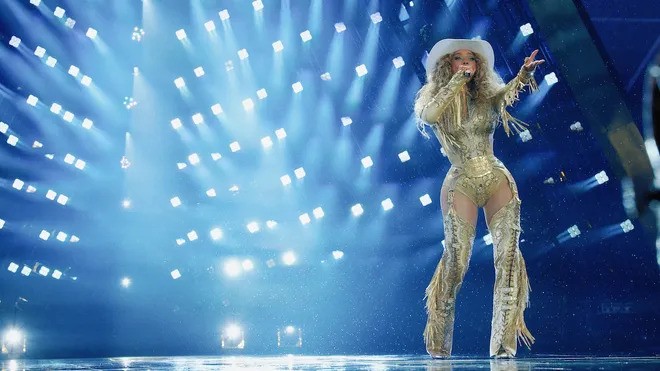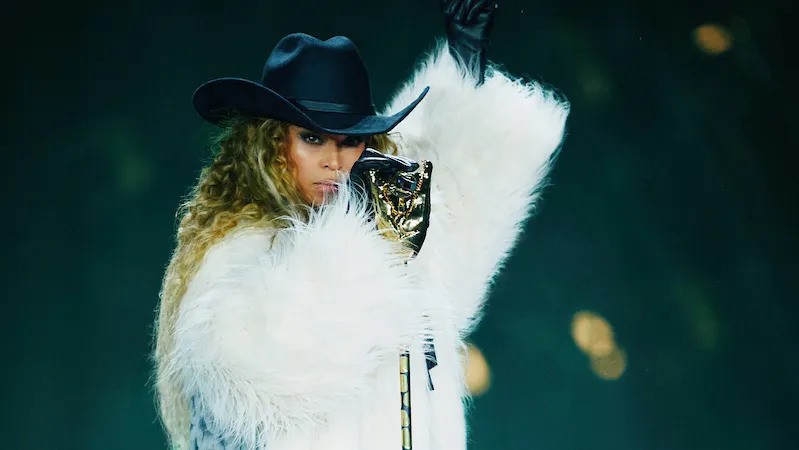When Beyoncé takes a stage, the world watches. And when she brought her Cowboy Carter and the Rodeo Chitlin’ Circuit Tour to Atlanta’s Mercedes-Benz Stadium on July 10, she didn’t just perform—she created a Southern, soulful spectacle that paid homage to her roots while pushing her artistry into bold new territory.
This wasn’t just any tour stop. It felt like a moment—a cultural reset wrapped in denim, rhinestones, and Southern pride. From the fiery performances to intimate family moments, Beyoncé once again proved why she remains at the center of the cultural zeitgeist. And with three more nights scheduled in the same venue (July 11, July 13, and July 14), Atlanta fans are in for a royal rodeo they won’t forget.
Let’s ride into everything that made night one unforgettable.
The Queen Bey hit the stage at 8:15 p.m. local time, and the energy in the stadium was electric before she even sang a note. “Atlanta, Georgia! I’m so happy to be standing on this stage tonight,” Beyoncé told the roaring crowd. And from that moment forward, it was clear that she came not just to perform, but to connect—with the culture, with the city, and with her fans.
Southern hospitality was in the air. Beyoncé later thanked the crowd explicitly for their warmth and enthusiasm, saying, “Thank y’all so much for your incredible Southern hospitality.” It was a touching moment that highlighted how much this tour—and this particular stop—meant to her.
Fans didn’t take her words lightly, either. Social media erupted with praise and speculation. Some fans even theorized that Atlanta’s energy might’ve been so unmatched that Beyoncé was filming the show for a future visual project. “Oh she’s feeling it!” one fan posted. Another added, “She’s giving ATL a SHOW. Got me wanting to book a flight for the next one.”
While the filming remains unconfirmed, what’s undeniable is that Beyoncé gave Atlanta everything she had.
This stop follows two stunning performances in Landover, Maryland, just outside of Washington, D.C., on July 4 and July 7. The Independence Day concert was particularly powerful, especially considering Cowboy Carter’s themes of American identity, cultural history, and reclamation of the country music genre by Black artists.
But Atlanta felt different—more personal. Maybe it was the city’s deep ties to Black musical history, or maybe it was the audience’s fierce energy. Either way, Beyoncé fed off that vibe and delivered a show that many are already calling the best of the tour.
Perhaps the most show-stopping moment of the night came when Beyoncé brought back “16 Carriages,” a song she had previously cut from the tour after technical issues in Houston. Fans were already thrilled to see it return, but what really had jaws dropping was her entrance.
Instead of her now-iconic flying car, Beyoncé descended from the sky on a golden mechanical horse, complete with spinning rims—a dazzling and theatrical nod to both Western and Afrofuturist aesthetics.
It was a powerful image. Beyoncé, high above the crowd, golden and glowing, riding into Atlanta like a Southern goddess claiming her throne. The horse replaced the car stunt that had proved difficult earlier in the tour and proved that when Beyoncé makes changes, she does it with style and intention.
And the crowd? They lost it. Social media lit up with videos and GIFs of the moment, with fans declaring it one of the most iconic entrances in her touring history.

One of the night’s most heartwarming and viral moments came thanks to Beyoncé’s daughters, 13-year-old Blue Ivy and 8-year-old Rumi Carter.
Blue Ivy, no stranger to the stage (she became a fan-favorite on the Renaissance World Tour), showed off her moves during “America Has a Problem,” then strut off stage with confidence and flair—only to break into the “Whim Whamiee” dance. The viral move, created by Atlanta artists Pluto and YKNIECE, synced up perfectly with the lyrics “I’m talking about in it.”
Fans in the stadium—and online—couldn’t get enough. “I’m talmbout init. Blue Ivy is such a TikTok girl omg,” one fan posted. Another added, “She’s growing up and serving stage presence!”
But then came the real surprise: Rumi Carter joined in. At just 8 years old, Rumi made her stage debut with the same move, and the crowd erupted. The moment was adorable, unexpected, and deeply personal. It reminded everyone that Beyoncé isn’t just a performer—she’s a proud mom, and her family is part of her evolving narrative.
Beyond the return of “16 Carriages,” Beyoncé revived several other tour stunts and songs, creating a feeling of renewal and elevation.
During “Levii’s Jeans,” Beyoncé was carried across the stage on a mini sofa shaped like lips—another stunt that had been absent from recent tour stops. Her dancers held her mid-air as she sang, a sensual and surreal moment that fans were thrilled to see return.
And if that wasn’t enough, she also brought back her 2019 hit “Before I Let Go.” The song, which had been skipped in Washington D.C. and other recent shows, sent the Atlanta crowd into a frenzy. Fans danced, sang every word, and posted clip after clip online with captions like, “She brought it back just for us!”
It’s clear Beyoncé is tailoring each show with intent. While the core setlist may remain consistent, she’s creating unique moments at every stop—and Atlanta’s was brimming with fan-service, creativity, and surprises.
Beyoncé first debuted the Cowboy Carter tour at SoFi Stadium in Los Angeles on April 28, unveiling a 39-song setlist that spanned country, soul, pop, and gospel. Since then, each show has morphed slightly—new staging, surprise songs, and evolving choreography that reflects Beyoncé’s love for reinvention.
This tour is also unlike any Beyoncé tour before. It’s not just about spectacle (though there’s plenty of that). It’s about history. Cowboy Carter isn’t merely an album—it’s a reclamation. A bold, Black woman stepping fully into the country genre and rewriting the narrative of who belongs in that space.
By embracing the rodeo, the Western aesthetic, and the South’s deep complexity, Beyoncé is telling a story much bigger than herself. She’s channeling generations of Black artists who shaped the American sound and were too often erased from the story. And by touring through cities like Atlanta—where Black culture thrives—she’s turning that message into a movement.
Watching Beyoncé on stage, it’s impossible not to be struck by her command. She doesn’t just perform—she embodies. Whether she’s belting a ballad, riding a mechanical horse, or simply standing in stillness, there’s a magnetic pull. Her presence fills the room in a way few artists can manage.

But more than ever, this tour also feels intimate. Beyoncé is letting fans into her world—inviting them to see her not just as a megastar, but as a mother, a Southern woman, and a cultural leader. The inclusion of Blue Ivy and Rumi only reinforces that. This is a family affair, and the fans are extended kin.
With three more shows in Atlanta, fans are already wondering what else Beyoncé might have up her sleeve. Will she rotate more songs in and out? Will there be more surprise appearances from family or collaborators? Will the golden horse make another appearance?
One thing’s for sure: Beyoncé doesn’t do anything halfway. Each performance is its own event. And if night one is any indication, Atlanta is getting something special.
Beyoncé’s Cowboy Carter tour is more than a concert—it’s a moment in music history. It’s proof that evolution is not only possible but necessary. It’s evidence that genre walls can be broken, that family can be center stage, and that reinvention can still be deeply rooted in tradition.
Atlanta witnessed Beyoncé at her most creative, most joyful, and most intentional. From viral dances and flying horses to heartfelt tributes and cultural reclamation, she delivered a night that fans will remember for years to come.
And as one fan said best, “She didn’t come to play. She came to make history.”
Saddle up, y’all. Beyoncé’s just getting started.
